What Your Mouth Says About Your Health
Researchers examine the “oral microbiome” to look for clues to cancer risk.

In a continuing effort to better understand how cancers develop, some researchers are looking into the mouth and finding that poor oral health may be associated with increased risk for some types of the disease.
At the American Association for Cancer Research (AACR) Annual Meeting 2016, Jiyoung Ahn, PhD, associate professor of population health and associate director of population sciences at the Laura and Isaac Perlmutter Cancer Center at NYU Langone Medical Center in New York, discussed the connection between two particular strains of oral bacteria and pancreatic cancer.
Dr. Ahn and colleagues analyzed oral wash samples from 361 people who later went on to develop pancreatic cancer and from 371 matched controls. They used genomic technologies to generate a profile of the bacterial species present in each sample and performed logistic regression analysis to study the association between individual species of bacteria and risk of pancreatic cancer, controlling for other risk factors, including age, smoking status, and body mass index.
The researchers found that a bacteria called Porphyromonas gingivalis was associated with a 59 percent increased risk for pancreatic cancer.
Another type of bacteria, Aggregatibacter actinomycetemcomitans, was associated with a 119 percent increased risk.
“These data do not show a causal relationship, but they are the first steps in understanding a potential new risk factor for pancreatic cancer, which is vital if we are to develop new approaches for pancreatic cancer prevention and early detection in the future,” Dr. Ahn said.
Pancreatic cancer is one of the deadliest types of cancer; just 7.7 percent of patients survive five years or more after their diagnosis, according to federal data. Dr. Ahn said that while her findings must be confirmed by additional studies, they could potentially point to new ways to screen for the disease.
“And if the associations are found to be causal, they could point to potential prevention approaches,” she added.
Last December, researchers reported in a study published in the AACR’s journal Cancer Epidemiology, Biomarkers & Prevention that found women with periodontal disease were more likely to develop breast cancer, particularly if they had a history of smoking.
The lead author of that study, Jo L. Freudenheim, PhD, distinguished professor in the Department of Epidemiology and Environmental Health in the University at Buffalo’s School of Public Health and Health Professions, explained, “Previous research has found links between periodontal disease and oral, esophageal, head and neck, pancreatic, and lung cancers, so we wanted to see if there was any relationship with breast cancer.”
Dr. Freudenheim’s study included 73,737 postmenopausal women enrolled in the Women’s Health Initiative Observational Study, none of whom had previous breast cancer. Periodontal disease was reported in 26.1 percent of the women. Because prior studies have shown that the effects of periodontal disease vary depending on whether a person smokes, researchers examined the associations stratified by smoking status.
After a mean follow-up time of 6.7 years, 2,124 women were diagnosed with breast cancer. Compared with women who did not have periodontal disease, the risk of breast cancer was:
- 14 percent higher among all women who had periodontal disease;
- 36 percent higher among women who had quit smoking within the past 20 years;
- 32 percent higher among women who were smoking at the time of this study;
- 6 percent higher among women who had never smoked; and
- 8 percent higher among women who had quit smoking more than 20 years prior to the study.
In an interview, Dr. Freudenheim explained that periodontal disease is “a crude measure of the health of our oral microbiome, which includes all the microorganisms in the mouth.”
Like Dr. Ahn, she cautioned that the associations found in her study do not mean that there is a causal relationship between periodontal disease and cancer.
As with all scientific studies, there are limitations to these findings. Dr. Ahn cautioned that her study population was mostly non-Hispanic whites, so the results might not be generalizable to a wider population. Dr. Freudenheim pointed out that since her research focused on women who were enrolled in a long-term national health study, the women were more likely than the general population to be receiving regular medical and dental care, and may be more health conscious.